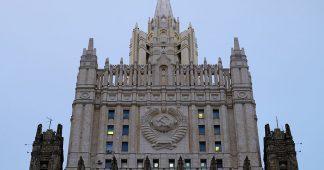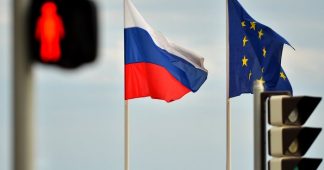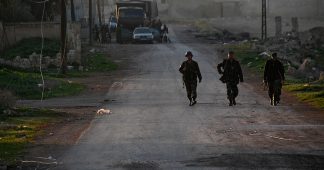Srebrenica Historical Project: Odd Srebrenica parallels mark current Syria crisis
14.04.2018
It would appear, on the available evidence, that the answer to our deliberately leading question is a resounding – Yes. On Monday, 9 April 2018, television viewers could follow the transmission of the UN Security Council debate in relation to the alleged use of toxic substances in the Syrian war theatre, by government forces which are supported by Russia. At a certain point during the heated proceedings, Russian Federation delegate Vassily Nebenzia turned to his Western “diplomatic colleagues” and referred sarcastically to an allegedly Russian coded “intercept” from Syria which had supposedly been recorded by British listening stations in Cyprus. It turns out that the very same day that the Security Council debate on the alleged mass poisoning was going on, the British media published an intercept concerning the “delivery” in Syria of a certain suspicious “package” in which Russia was said to be involved. The precise nature and composition of the package are yet to be clarified, but from the context of this revelation one could justifiably conclude that the mysterious parcel constituted something extremely compromising for Russia and the Syrian government.
Irrespective of whether one is prepared or not to attribute serious weight to this information as presented by the British media, it is highly unlikely that in the context of the Security Council debate the reference to the sinister “package” meant much, if anything at all, to the ordinary viewer. However, someone versed in the Srebrenica controversy recognized immediately the message embedded in the emerging narrative. The British intelligence “Russian package intercept” was the rehashing of a story already seen and heard before.
Under remarkably similar circumstances during the war in Bosnia, an allegedly “intercepted conversation,” also allegedly couched in highly coded language, and also referring to sinister “packages,” played a crucial role in the trial and conviction of Serbian General Radislav Krstić for “aiding and abetting in the commission of Srebrenica genocide.” In that alleged intercept which was, incidentally, accepted into evidence by the Hague Tribunal without ever being subjected to a proper forensic analysis, the conversation supposedly revolved around “3,500 packages that must be distributed.” The trial chamber of the Hague Tribunal which heard the Krstić case deciphered these cleverly constructed shibboleths very conveniently to mean that the 3,500 packages was a reference to as many captured enemy soldiers, while the mysterious word „distribution“ was held by the court to be a coded allusion to their imminent execution.
So, the lineage of the extraordinary information shared by the London “Times” on 9 April 2018 about the appearance of sinister “packages” in Syria takes us directly back to the Srebrenica “genocide” intercept hoax of two decades ago. The fact that the metaphor has now been resuscitated, at just the right time to be conveniently fitted into both false narratives de jour, the Sergey Skripal poisoning in England and the fabricated mass poisoning in Syria, points irrefutably to the advanced state of sclerosis gripping Western propaganda mavens. Their reserves of imagination are exhausted, so they invariably always return to yesterday’s threadbare matrix. Whatever partial success in mass deception they are still having, the credit is due not to the brilliancy of their skills but exclusively to the public’s notoriously short memory and even shorter attention span. For quite a long time they have not produced a single original idea. Another example comes to mind.
When the Norwegian documentary “Srebrenica: A Town Betrayed”, was broadcast in 2011, great offense was taken because testimony was included that Bosnian Muslim President Alija Izetbegović used the occasion of a Muslim political gathering in Sarajevo in late September 1993 to discuss an amazing offer made to him by President Bill Clinton. If Serbs could be lured into capturing Srebrenica and then committing the slaughter of at least 5,000 residents – so this callous offer allegedly went — the massacre would impress American public opinion sufficiently to gain public support for President Clinton’s intervention in the war on the Bosnian Muslim side.
The probability that this version of events, shocking as it may be, might contain a grain of truth gained considerable corroboration somewhat later when another curious set of circumstance came to light. In the aftermath of the NATO bombing of Yugoslavia in 1999, it turned out that Kosovo Albanians were also being talked by someone into entertaining expectations very similar to those held by the Bosnian Muslims shortly before. They were told, as we subsequently learned, that if they managed to engineer the sacrifice of about 5,000 Albanian civilians at the hands of Serbian forces in Kosovo, the resulting outrage would ensure the intervention of NATO forces on their behalf. In a broadcast on BBC2, 12 March 2000, Kosovo Albanian negotiator Dugi Gorani expounds that proposition as follows: “The more civilians were killed, the chances of international intervention became bigger, and the Kosovo Liberation Army [KLA] of course realised that. There was this foreign diplomat who once told me, ‘Look unless you pass the quota of five thousand deaths you’ll never have anybody permanently present in Kosovo from the foreign diplomacy’”.
It used to be possible to view a video clip of Gorani’s remarks until inexplicably it disappeared from the internet. Luckily, the transcript still survives on BBC’s website.
For those inclined to believe that Izetbegović and Kosovo Albanian leaders would have hesitated to inflict such an outrage on their own people for mere political gain, the following segment of the same BBC broadcast suggests otherwise:
ALAN LITTLE [programme announcer] : [1]
It was a calculated but dangerous gamble. The KLA’s political leader Hashim Thaqi now admits that he knew the Serbs would retaliate against innocent civilians.
HASIM THACI [KLA leader]:
Any armed action we undertook would bring retaliation against civilians. We knew we were endangering a great number of civilian lives.
The calculating stance of the Albanian side, devoid of humanitarian compunctions, was reaffirmed by Gorani as follows: “Every single Albanian realised that the more civilians die, intervention comes nearer…”
BBC’s NATO bombing post-mortem in the year 2000 is of interest also for laying bare the interventionist rationale on the Western side.
ALAN LITTLE [programme announcer]:
The western world was still haunted by a profound collective guilt: it knew it had waited too long to intervene in Bosnia. Now one woman resolved not to make the same mistake again.
MADELEINE ALBRIGHT [US Secretary of State]:
I believed in the ultimate power, the goodness of the power of the allies and led by the United States. We were dealing with such a basic evil that could not be tolerated… I thought it behooved me to say to my colleagues that we could not repeat the kinds of mistakes that had happened over in Bosnia, where there was a lot of talk and no action and that history would judge us very, very severely.
That evil, it was helpfully explained by Little, were the designs of Slobodan Milošević: “He’d persuaded the Serbian people that they were surrounded by predatory enemies, and led them to war against their neighbours… The world had failed to defend the Bosnians against Milosevic. In 1995, Serb forces marched into Srebrenica and murdered seven thousand Bosnian Muslim men and boys. In the West, many came to believe that the lessons of Bosnia could now be applied to the very different circumstances of Kosovo.”
Referring to the factors that finally prevailed in favour of Kosovo intervention, Mrs. Albright declared in the BBC interview that “I decided it was worth it”, a déjà vu if there ever was one from that lady [2]
The invocation of the 5,000 victim figure as a trigger for military intervention in the context of Kosovo not only lends corroboration to the report of an identical offer having been made during the war in Bosnia; it serves also as another striking illustration of Diana Johnstone’s thesis about “the political uses of Srebrenica”. Madeleine Albright repeatedly made it clear that she used the alleged failure to intervene to prevent a humanitarian disaster in Srebrenica as the rationale for later successfully advocating military action in Kosovo.
This also illustrates something else. In both cases, when the need arose to induce a Western “humanitarian intervention”, first in Bosnia, then in Kosovo, the “magic number,” 5,000 victims required to trigger political action, was invariably the same. Today, when the playbook calls for smearing Russia, they are engaged in the digging up and conceptual adaptation of “intercepts” dating back to the Krstić Srebrenica trial of almost two decades ago.
Western policy-makers and their media appendages are devoid of creative imagination. They can do little more than stick to the same, worn-out, constantly recycled templates. [3]
Endnotes:
Published at https://www.strategic-culture.org/news/2018/04/14/could-they-possibly-be-so-unimaginative.html











